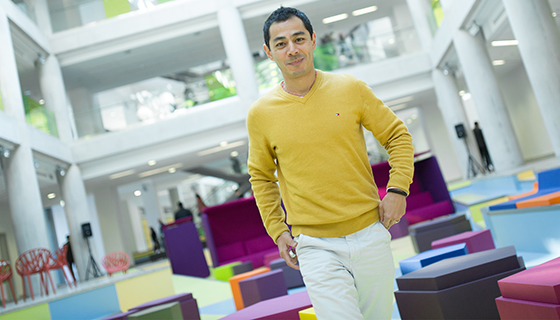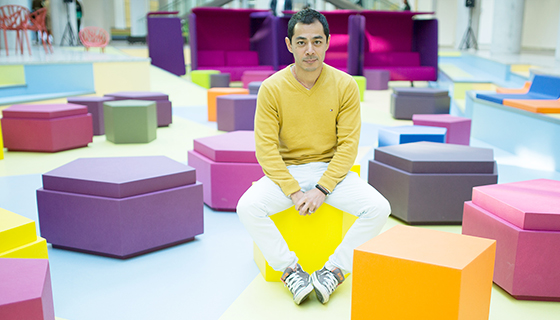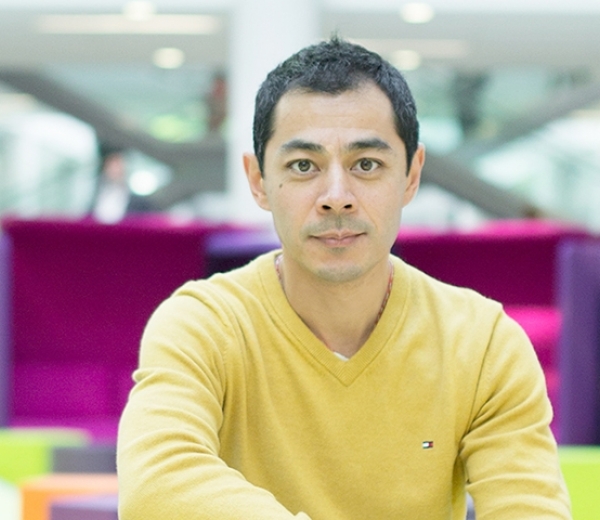David Yan is a man of many talents and unparalleled energy. Born in Yerevan in1968 to an Armenian mother and a Chinese father, in his lifetime he has already built a global high-tech empire (ABBYY), developed the first pocket computer for young people (Cybiko), created a new-generation management system for restaurants and hospitality services (iiko) and a mobile payments system (Platius), opened an art café and four other venues in Moscow, launched an educational foundation (Ayb), published a book (“Now I Eat All I Want!”), designed a home for his family, earned a Ph.D. in math and physics, starred in a TV show, organized flash mobs and partook in countless other business and philanthropic initiatives as co-founder, co-investor and adviser. He has even derived the “happiness formula” and knows how to achieve immortality.
For such an accomplished visionary, David is disarmingly soft-spoken and casual, sporting jeans and a hoodie and at ease with any tricky question thrown his way. He is confident, thoughtful and eloquent. 100 LIVES caught up with David at a local coffee shop in Portola Valley and asked him about his modus operandi and about what makes Armenia special.
Interview by Anna Arutiunova
100 LIVES: Every time you venture into seemingly unfamiliar territory with a new project, you end up succeeding. What makes you so confident in your ability to succeed outside your comfort zone?
D.Yan: I am not terribly afraid to make mistakes. I don’t really spend time wondering what happens if I fail. There’s certainly some enthusiasm, some confidence at the beginning. It partly has to do with my student years at the Moscow Institute of Physics and Technology (MIPT): people who go through this “boot camp” aren’t easily intimidated. It's a kind of “offensive reconnaissance,” if you will. If everyone errs on the side of caution, nothing will get done.
But, of course, no man is an island. There is no army of one. There must be a group of enthusiasts, people who egg each other on, who support and inspire each other’s confidence in a common vision. I never launch a new business on my own.
If your idea doesn’t seem to resonate with anyone at some point you also lose faith in it. If no one wants to join you in battle, you probably shouldn’t be fighting it. YCombinator [the most commercially successful seed accelerator in the world] recently analyzed data about the companies it worked with: startups valued at over $100 million had two or three co-founders.
100 LIVES: In a number of interviews you've mentioned that no business can succeed if turning a profit is its main goal. As a Silicon Valley-based investor and startup adviser today, do you still believe that to be the case? Sometimes people approach you with their pitches and you must evaluate their commercial viability.
D.Yan: Commercial viability is not about making money, it's about something else. It's about doing something that someone else needs. I think it was Steve Jobs who once said: “Make the world around you better, and the world will take care of you.” That’s just another definition of marketing.
An entrepreneur's or a businessman's goal, just like that of any other person, should be to do something for the benefit of others.
100 LIVES: Do you have a dream? In the Soviet times you dreamt of jeans and sneakers. What about now?
D.Yan: Sure, for example the
Ayb School…I very much understand Aram Pakhchinian, who dropped what he was doing and moved to Armenia to head the school. I dream of setting up a school that will graduate people who will change the world for years to come.
There are simpler things, of course…Like finally building a house.
100 LIVES: Where is your home? Or are you a citizen of the world?
D.Yan: Even though we now live in the Silicon Valley, our home is still in Moscow. Here in the United States we'll be nomads until we build our own house. It won't have vertical walls or right angles. The city has already approved this blueprint – we were quite worried that a building permit would be denied for such an usual construction. But the local authorities said it was the most beautiful project in the town's history.
100 LIVES: Do you consider yourself Armenian?
D.Yan: I do. I consider Armenia to be my homeland. I also consider China to be my homeland. Actually, I have three homelands: China, Armenia and Russia. I grew up in Armenia; I graduated from a school specializing in physics and mathematics in Yerevan. If it weren't for my school, I would never have met Gagik Grigoryan or my classmates, who made me want to apply to MIPT. Ashot Aslanyan and other seniors from the Institute would come and teach us physics. Thanks to them I was admitted to the Institute, and if that didn’t happen, there would have been no ABBYY, no Lingvo, no FineReader. Without Armenia, at least half of me would be missing, and I would have been a completely different person.
100 LIVES: What exactly does it mean to be Armenian?
D.Yan: I think the Armenian blood I got from my mother gave me that almost physical need to constantly launch new projects. My Chinese blood, on the other hand, makes me want to finish what I start.
100 LIVES: Are you trying to balance being romantic and pragmatic?
D.Yan: Chinese heritage is not exactly about pragmatism, it’s more like having diligence in your blood. I see it in my father and I see it in Chinese students at local schools and colleges. There’s a characteristic that is common to all of them. Once you start, you do the work and see it through to the end.
100 LIVES: So are there certain characteristics that set Armenians apart from other people?
D.Yan: Of course. Initiative is one. Creativity and a convergence of various art forms is another. I think on average, more people in Armenia are drawn to different art forms than elsewhere. And this is very important, because this convergence gives Armenians a certain kind of unique genetic advantage. They need to make use of this advantage, but for that people need to work as a team, to learn to take pride and joy in collective accomplishments. It is very important for initiative to end up being transformed into something that will outlive you.
That is why what Ruben [Vardanyan] does is very important, because that's basically the focus of his project: to learn to do something together, jointly, as a team. Being an outstanding individual is a very important quality, but by definition it is the opposite of collectivism. In that sense, the people who are doing something in Armenia are extraordinary individuals. They are world-famous artists and musicians. But it's like keeping a bunch of tigers locked up in the same cage: it's very hard to get them to do something together.
100 LIVES: Ok, that's romantic, but let's talk reality. In your highly inspirational graduation speech at Ayb, you talked about the students having to go out and change Armenia and the world. How do you imagine them doing it in real life?
D.Yan: In the same way I do it, Ruben does it, my friends do it.
100 LIVES: So you want them to launch startups?
D.Yan: I want them to accomplish something in life and then give back to their homeland. The Armenian people have preserved very strong internal ties that last a very long time, maybe forever. People can emigrate to the United States, to Russia, to France, but something will keep nagging at them until they do something for their country. I see it in myself and in my college classmates: they deem it necessary to come back and do something for their country.
100 LIVES: Is the concept of “homeland” important?
D.Yan: Absolutely, it is of utmost importance. It's an irrational feeling you have. It's dualism.
On the one hand, many of us are citizens of the world, we speak many languages, partake in international projects, travel a lot. But the more borders get erased, the lonelier one feels, as strange as it sounds.
You can send a text or Viber message anywhere in the world, to people on other continents, but what you need is something else, something more real, something you can touch. A foundation. You start realizing that easy comes, easy goes.
You come to Armenia and see Mt. Ararat; you see the churches dating back to the fourth, seventh, 12th centuries, the black volcanic tuff covered in moss. You go inside and you see the carvings, you see the light streaming through the windows, you realize that that light has been there for hundreds of years. You attend a service and realize it has been held in the same way throughout the centuries. And you realize that WhatsApp, Skype, Viber – all those are great, but there is something that you can actually touch, and it makes it that much more valuable.



